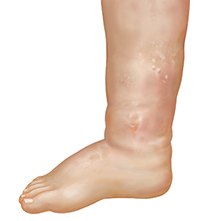Heart Failure: Warning Signs of a Flare-Up
You have heart failure. Once you have heart failure, flare-ups can happen. Below are signs that can mean your heart failure is getting worse. If you notice any of these warning signs, call your healthcare provider.
Swelling
-
Your feet, ankles, or lower legs get puffier.
-
You notice skin changes on your lower legs.
-
Your shoes feel too tight.
-
Your clothes are tighter in the waist.
-
You have trouble getting rings on or off your fingers.

Shortness of breath
-
You have to breathe harder even with normal activity or at rest.
-
You're short of breath walking up stairs or even short distances.
-
You wake up at night short of breath or coughing.
-
You need to use more pillows or sit up to sleep.
-
You wake up tired or restless.
Other warning signs
-
You feel weaker, dizzy, or more tired.
-
You have chest pain or changes in your heartbeat.
-
You have a cough that won’t go away.
-
You can’t remember things or don’t feel like eating.
-
You have trouble sleeping.
Tracking your weight
Gaining weight is often the first warning sign that heart failure is getting worse. Gaining even a few pounds can be a sign that your body is retaining excess water and salt. Weighing yourself each day in the morning after you pee and before you eat, is the best way to know if you're retaining water. Get a scale that's easy to read. Make sure you wear the same clothes and use the same scale every time you weigh yourself. Your healthcare provider will show you how to track your weight. Call your provider if you gain:
-
More than 2 pounds in 1 day
-
More than 5 pounds in 1 week
-
Or whatever weight gain you were told to report by your provider
This has to be evaluated and treated before it affects your breathing. Your provider will tell you what to do next.
Online Medical Reviewer:
Ronald Karlin MD
Online Medical Reviewer:
Stacey Wojcik MBA BSN RN
Online Medical Reviewer:
Steven Kang MD
Date Last Reviewed:
10/1/2021
© 2000-2025 The StayWell Company, LLC. All rights reserved. This information is not intended as a substitute for professional medical care. Always follow your healthcare professional's instructions.